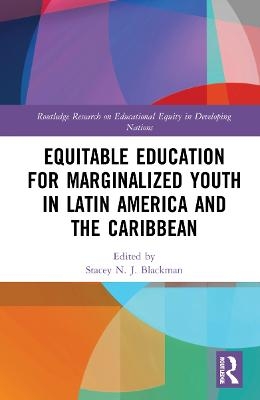
Equitable Education for Marginalized Youth in Latin America and the Caribbean
Routledge (Verlag)
978-0-367-22790-6 (ISBN)
This edited volume examines the thrust toward equity in education for marginalized and out-of-school youth, as well as youth with disabilities, in countries located in the Global South.
Using a critical cross-cultural lens to interrogate the historical, empirical, and theoretical discourses associated with achieving UNESCO’s equity in education agenda, the book showcases the work of scholars from developed and developing nations in examining inclusive education. Drawing attention to the nature, impact, and effects of marginalization, the book ultimately demonstrates the ability of education systems in the Global South to be innovative and agile despite current resource challenges.
This text will benefit scholars, academics, and students in the fields of international and comparative education, education policy, and inclusion and special educational needs education more broadly. Those involved with Caribbean and Latin American studies, the sociology of education, and diaspora studies in general will also benefit from this volume.
Stacey N. J. Blackman is Lecturer in Special Education at the University of the West Indies at Cave Hill, Barbados.
Introduction: Equity in Education—Situating the Discourse on the Marginalization of Children and Youth in Latin America and the Caribbean
Stacey N. J. Blackman
Part I: Understanding the Marginalization of Children and Youth in Latin America and the Caribbean
1 Theorizing on the Marginalization of Boys and Girls in Caribbean Schooling: Recurring Myths and Emerging Realities
Jerome De Lisle
2 Perpetrators, Aiders and Abettors, or Weapons of Mass Destruction: A Paradoxical Analysis of the Role of Caribbean and Latin American Educational Systems in the Delivery of Equitable Education
Ian A. Marshall
3 Disparities in Education Outcomes in Trinidad and Tobago: A Sociohistorical Analysis
Linda Hewitt and Iris Hewitt-Bradshaw
Part II: Children's and Youths’ Experiences of Exclusion in Latin America and the Caribbean
4 Investigating Factors Associated with Mathematics Achievement and Youth Marginalization in Jamaica
Lois George
5 Principals’ Narratives on the Risk of Marginalization for Barbadian Children with Special Needs During COVID-19
Stacey N. J. Blackman, Grace A. Fayombo, and Junnie O. Lynch
6 Barriers to Technology-Enabled Education for the Deaf in the Caribbean
André Coy
7 Chocolate, Children, and the Curriculum: Child Exploitation and the Dominican Cocoa Industry
Eve Hayes de Kalaf and Leona Vaughn
Part III: Interventions and Advocacy for Marginalized Children and Youth in Latin America and the Caribbean
8 Design, Development, and Implementation: An Autoethnographic Account of a STEM and Literacy Program for English Language Learners in Panama
Beverly A. King Miller, Joy Williams Haaf, and Aleshia C. Hill
9 Experiences in Providing Vocational Skills Training Support for Youth in Care in Jamaica
Priya Anaokar, Marva Campbell, Julie Meeks Gardner, Ceceile Minott, Andrien Perkins, Kathi-Ann Thomas, and Joan Thomas
10 Tackling Marginalization in Education through Teacher Preparation: A Case for Learning Without Limits as Inclusion
Stacey N. J. Blackman
| Erscheinungsdatum | 17.08.2022 |
|---|---|
| Reihe/Serie | Routledge Research on Educational Equity in Developing Nations |
| Zusatzinfo | 18 Tables, black and white; 7 Line drawings, black and white; 7 Halftones, black and white; 14 Illustrations, black and white |
| Verlagsort | London |
| Sprache | englisch |
| Maße | 152 x 229 mm |
| Gewicht | 467 g |
| Themenwelt | Sozialwissenschaften ► Pädagogik ► Allgemeines / Lexika |
| Sozialwissenschaften ► Pädagogik ► Bildungstheorie | |
| Sozialwissenschaften ► Pädagogik ► Sonder-, Heil- und Förderpädagogik | |
| ISBN-10 | 0-367-22790-8 / 0367227908 |
| ISBN-13 | 978-0-367-22790-6 / 9780367227906 |
| Zustand | Neuware |
| Informationen gemäß Produktsicherheitsverordnung (GPSR) | |
| Haben Sie eine Frage zum Produkt? |
aus dem Bereich


